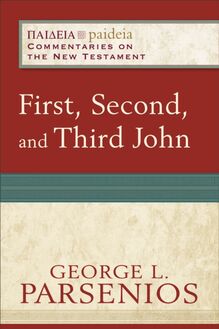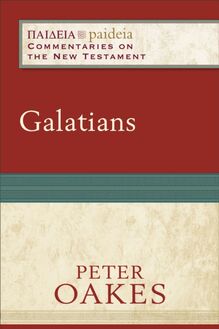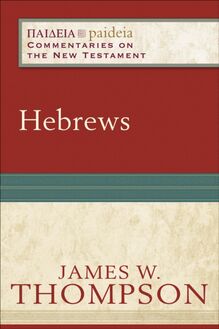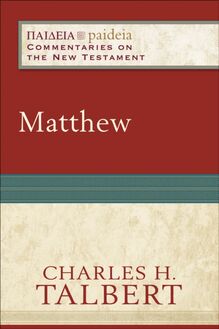Galatians (Paideia: Commentaries on the New Testament) , livre ebook
138
pages
English
Ebooks
2015
Vous pourrez modifier la taille du texte de cet ouvrage
Obtenez un accès à la bibliothèque pour le consulter en ligne En savoir plus
Découvre YouScribe en t'inscrivant gratuitement
Découvre YouScribe en t'inscrivant gratuitement
138
pages
English
Ebooks
2015
Vous pourrez modifier la taille du texte de cet ouvrage
Obtenez un accès à la bibliothèque pour le consulter en ligne En savoir plus
Publié par
Date de parution
14 avril 2015
Nombre de lectures
0
EAN13
9781441246516
Langue
English
Poids de l'ouvrage
3 Mo
Publié par
Date de parution
14 avril 2015
Nombre de lectures
0
EAN13
9781441246516
Langue
English
Poids de l'ouvrage
3 Mo
G ENERAL E DITORS
Mikeal C. Parsons, Charles H. Talbert, and Bruce W. Longenecker
A DVISORY B OARD
†Paul J. Achtemeier
Loveday Alexander
C. Clifton Black
Susan R. Garrett
Francis J. Moloney
© 2015 by Peter Oakes
Published by Baker Academic
a division of Baker Publishing Group
P.O. Box 6287, Grand Rapids, MI 49516-6287
www . bakeracademic . com
Ebook edition created 2015
All rights reserved. No part of this publication may be reproduced, stored in a retrieval system, or transmitted in any form or by any means—for example, electronic, photocopy, recording—without the prior written permission of the publisher. The only exception is brief quotations in printed reviews.
Library of Congress Cataloging-in-Publication Data is on file at the Library of Congress, Washington, DC.
ISBN 978-1-4412-4651-6
Unless otherwise indicated, all Scripture quotations are the author’s own translation.
Contents
Cover i Series Page ii Title Page iii Copyright Page iv List of Figures vii Foreword ix Preface xi Abbreviations xiii Introduction 3 Galatians 1:1–10 Letter Opening 34 Galatians 1:11–24 Narrative 1: Of a Gospel Revealed by God, Not People 50 Galatians 2:1–10 Narrative 2: Of a Gospel Affirmed by Unity at Jerusalem 64 Galatians 2:11–21 Narrative 3: Of a Gospel Betrayed by Division at Antioch 75 Galatians 3:1–14 Argument 1: For Blessing in Christ through Trust 99 Galatians 3:15–29 Argument 2: For Unity in Christ 118 Galatians 4:1–11 Argument 3: Against Returning to Slavery 133 Galatians 4:12–20 Instructions with Argument 1: “Be like Me” 144 Galatians 4:21–5:13a Instructions with Argument 2: “Do Not Be Subject Again to . . . Slavery” 153 Galatians 5:13b–6:10 Instructions with Argument 3: “Through Love Be Slaves to One Another” 167 Galatians 6:11–18 Letter Closing 185 Bibliography 195 Index of Subjects 205 Index of Modern Authors 209 Index of Scripture and Ancient Sources 213 Back Cover 220
Figures
1. View of the mountains along the highland route from Iconium to Pisidian Antioch 5
2. Atrium of craftworker’s house in Pompeii 13
3. Galatia and neighboring provinces at the time of Paul’s letter 17
4. Letter of Demarion and Irene 35
5. Dining room of the association of builders at Ostia 78
6. Powerful eyes 102
7. Ancient curse tablet 108
8. Site known as Lydia’s Baptistry, near Philippi 131
9. Temple of the imperial cult at Ankara 140
10. Pax coin 177
Foreword
Paideia: Commentaries on the New Testament is a series that sets out to comment on the final form of the New Testament text in a way that pays due attention both to the cultural, literary, and theological settings in which the text took form and to the interests of the contemporary readers to whom the commentaries are addressed. This series is aimed squarely at students—including MA students in religious and theological studies programs, seminarians, and upper-division undergraduates—who have theological interests in the biblical text. Thus, the didactic aim of the series is to enable students to understand each book of the New Testament as a literary whole rooted in a particular ancient setting and related to its context within the New Testament.
The name “Paideia” (Greek for “education”) reflects (1) the instructional aim of the series—giving contemporary students a basic grounding in academic New Testament studies by guiding their engagement with New Testament texts; (2) the fact that the New Testament texts as literary unities are shaped by the educational categories and ideas (rhetorical, narratological, etc.) of their ancient writers and readers; and (3) the pedagogical aims of the texts themselves—their central aim being not simply to impart information but to form the theological convictions and moral habits of their readers.
Each commentary deals with the text in terms of larger rhetorical units; these are not verse-by-verse commentaries. This series thus stands within the stream of recent commentaries that attend to the final form of the text. Such reader-centered literary approaches are inherently more accessible to liberal arts students without extensive linguistic and historical-critical preparation than older exegetical approaches, but within the reader-centered world the sanest practitioners have paid careful attention to the extratext of the original readers, including not only these readers’ knowledge of the geography, history, and other contextual elements reflected in the text but also their ability to respond correctly to the literary and rhetorical conventions used in the text. Paideia commentaries pay deliberate attention to this extratextual repertoire in order to highlight the ways in which the text is designed to persuade and move its readers. Each rhetorical unit is explored from three angles: (1) introductory matters; (2) tracing the train of thought or narrative or rhetorical flow of the argument; and (3) theological issues raised by the text that are of interest to the contemporary Christian. Thus, the primary focus remains on the text and not its historical context or its interpretation in the secondary literature.
Our authors represent a variety of confessional points of view: Protestant, Catholic, and Orthodox. What they share, beyond being New Testament scholars of national and international repute, is a commitment to reading the biblical text as theological documents within their ancient contexts. Working within the broad parameters described here, each author brings his or her own considerable exegetical talents and deep theological commitments to the task of laying bare the interpretation of Scripture for the faith and practice of God’s people everywhere.
Mikeal C. Parsons Charles H. Talbert Bruce W. Longenecker
Preface
Unity in diversity in Christ. People of all kinds eating together through common relation to Christ. A trip to Jerusalem that finds unity. Unity broken at Antioch. An argument building to oneness in Christ. An ethic centered on love, the key virtue for unity.
At stake is the Galatians’ pistis : their trust in Christ and, consequently, their fidelity to Christ. If these gentiles run off down the road toward dependence on Jewish law, they forget what Christ has done on their behalf on the cross.
Particular thanks are due to the following:
Andrew Boakye, David Harvey, Nijay Gupta, and James Dunn for reading and offering valuable comments on part or all of the draft commentary;
John Barclay and Tom Wright, and to John Elliott, Philip Esler, and other Context Group colleagues for helpful discussion of key points;
the Nordic Theology Network, University of Helsinki, and Stockholm School of Theology, especially Rikard Roitto;
George Brooke, Todd Klutz, Sarah Whittle, and other colleagues in the Ehrhardt Seminar at Manchester;
PhD students during the writing of the commentary: Elif Aynaci (and, for the photographs, her brother Burak Karaman), Soon Yi Byun, Stephen McBay, Richard Britton, Isaac Mbabazi, Jonathan Tallon, Sungjong Kim, and Pyung-Soo Seo;
Robert and Dawn Parkinson and everybody at Didsbury Baptist Church;
Conrad Gempf and Robert Morgan for classes on Galatians, and to many fellow students, especially Sean Winter, Brad Braxton, and Moyer Hubbard.
Thanks are also due to the many great scholars whose published work has helped in understanding Galatians—above all to my former Manchester colleague, Martin de Boer, 1 whose commentary is now the benchmark for thorough work on the letter. The present commentary was essentially completed in 2013. I look forward to future opportunities to interact with many more recent works, especially that of N. T. Wright, 2 significant commentaries by Douglas Moo 3 and by Andrew Das, 4 and the important collection edited by Mark Elliott, Scott Hafemann, N. T. Wright, and John Frederick. 5
Finally, my thanks go to all who have helped bring the commentary through to completion: to the series editors, especially Bruce Longenecker, and to the editorial committee, especially Loveday Alexander; to James Ernest, for repeated help over the several years it took to write; to Wells Turner, Rachel Klompmaker, Mason Slater, and the rest of the production and marketing teams at Baker Academic; above all, for endless work and support, to Janet.
1 . Galatians: A Commentary (Louisville: Westminster John Knox, 2011).
2 . Paul and the Faithfulness of God , 2 vols., Christian Origins and the Question of God 4 (London: SPCK; Minneapolis: Fortress, 2013).
3 . Galatians , Baker Exegetical Commentary on the New Testament (Grand Rapids: Baker Academic, 2013).
4 . Galatians , Concordia Commentary (St. Louis: Concordia, 2014).
5 . Galatians and Christian Theology: Justification, the Gospel, and Ethics in Paul’s Letters (Grand Rapids: Baker Academic, 2014).
Abbreviations
General // parallel to § section AT author’s translation esp. especially frg. fragment lit. literally m 2 square meters NT New Testament OT Old Testament trans. translated by, translation (in) x when preceded by a numeral, designates how often an item occurs Bible Texts, Editions, and Versions LXX Septuagint, the Greek Bible MT Masoretic Text: the Hebrew Bible NIV New International Version (2011 edition) NIV 1984 New International Version (1984 edition) NRSV New Revised Standard Version Ancient Manuscripts and Papyri ℵ Codex Sinaiticus B Codex Vaticanus 𝔐 Majority Text 𝔓 46 Papyrus 46 P.Brem. Die Bremer Papyri . Edited by U. Wilcken. Berlin, 1936. Ancient Corpora O LD T ESTAMENT Gen. Genesis Exod. Exodus Lev. Leviticus Num. Numbers Deut. Deuteronomy Josh. Joshua Judg. Judges Ruth Ruth 1–2 Sam. 1–2 Samuel 1–2 Kings 1–2 Kings 1–2 Chron. 1–2 Chronicles Ezra Ezra Neh. Nehemiah Esther Esther Job Job Ps(s). Psalm(s) Prov. Proverbs Eccles. Ecclesiastes Song Song of Songs Isa. Isaiah Jer. Jeremiah Lam. Lamentations Ezek. Ezekiel Dan. Daniel Hosea Hosea Joel Joel Amos Amos Obad. Obadiah Jon. Jonah Mic. Micah Nah. Nahum Hab. Habakkuk Zeph. Zephaniah Hag. Haggai Zech. Zechariah Mal. Mal









